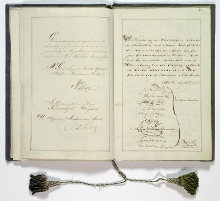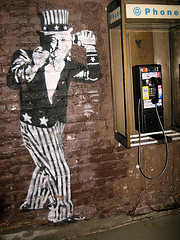 Engelfriet writes on his blog:
Engelfriet writes on his blog:
An [Internet trend] I had not seen before, Pinterest, is a service that lets you publicly bookmark images, a sort of virtual notice board. […] Is this legal, can anybody just make a collection of images from everywhere without the rights holders’ permission?
No, this is not legal. […] If I were older and more cynical, I would now announce the bankruptcy of copyright law for images. Everybody, and I mean everybody, thinks it is normal that you take images off Google for your mood boards, blogs, and Facebook accounts. And this is happening on a grand scale. The uploaders are difficult to track, middlemen are not accountable, and notice-and-take-downs are a lost battle.
[…] If half of the country breaks the law, it is time to start wondering if the law should not be changed.
In the comments Engelfriet (who incidentally has helped us in the past and who regularly comments here too) gives several examples of road rules that have been adapted following civil disobedience: on one hand, cyclists can now turn right on a red light in certain situations, but on the other, they are still obliged to use bike lights when it’s dark outside. Compliance with the latter rule has, however, been increased with safety campaigns and stricter policing.
(Illustration: pinterest.com)


 The business court of The Hague has determined that Dutch Rail can abolish paper train tickets even though the law says a traveller has a right to an objective proof of the right to travel.
The business court of The Hague has determined that Dutch Rail can abolish paper train tickets even though the law says a traveller has a right to an objective proof of the right to travel. Article 13 of the Dutch constitution declares a secrecy of correspondence, meaning the government and others are not allowed to snoop on your mail.
Article 13 of the Dutch constitution declares a secrecy of correspondence, meaning the government and others are not allowed to snoop on your mail.  By not informing its users about what data it collects and by not asking for permission, Google is breaking the Dutch data protection act, privacy watchdog
By not informing its users about what data it collects and by not asking for permission, Google is breaking the Dutch data protection act, privacy watchdog  Dutch people who accept payments in the new Internet currency Bitcoin will have to pay income tax on the funds they receive. Finance Minister Jeroen Dijsselbloem confirmed this two weeks ago after parliament had asked questions about Bitcoin,
Dutch people who accept payments in the new Internet currency Bitcoin will have to pay income tax on the funds they receive. Finance Minister Jeroen Dijsselbloem confirmed this two weeks ago after parliament had asked questions about Bitcoin,  A homeowners’ association in Rotterdam recently wanted a member to remove a satellite dish from his flat. Dishes are considered an eyesore and they decrease the enjoyment other owners have of their flats.
A homeowners’ association in Rotterdam recently wanted a member to remove a satellite dish from his flat. Dishes are considered an eyesore and they decrease the enjoyment other owners have of their flats.  Why would you want to ask a court whether an Apple iPad is a phone or a general computer? Well, if computers given as a Christmas bonus are considered income and phones are not, you might have an incentive, especially if the back taxes amount to 323,687 euro.
Why would you want to ask a court whether an Apple iPad is a phone or a general computer? Well, if computers given as a Christmas bonus are considered income and phones are not, you might have an incentive, especially if the back taxes amount to 323,687 euro.